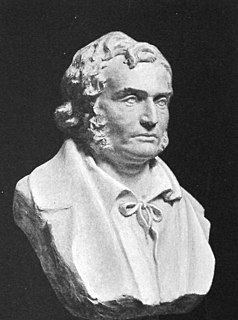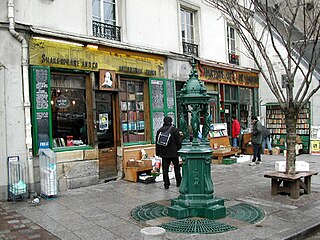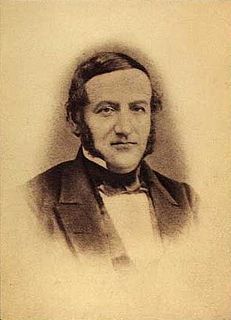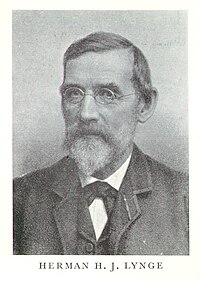
Poul Martin Møller was a Danish academic, writer, and poet. During his lifetime, he gained renown in Denmark for his poetry. After his death, his posthumously published fiction and philosophical writings were well received. He also devoted several decades of study to classical languages and literature. While serving as a professor at the University of Copenhagen, he was a mentor to the philosopher Søren Kierkegaard.

The Royal Library in Copenhagen is the national library of Denmark and the university library of the University of Copenhagen. It is among the largest libraries in the world and the largest in the Nordic countries. In 2017 it merged with the State and University Library in Aarhus to form a combined national library. The combined library organisation is known as the Royal Danish Library.

Bookselling is the commercial trading of books which is the retail and distribution end of the publishing process. People who engage in bookselling are called booksellers, bookwomen, or bookmen. The founding of libraries in 300 BC stimulated the energies of the Athenian booksellers. In Rome, toward the end of the republic, it became the fashion to have a library, and Roman booksellers carried on a flourishing trade.
Lynge is a family name of Danish and Swedish origin. The name is pronounced [ˈlyŋɡə] in Swedish.
Villy Sørensen was a Danish short-story writer, philosopher and literary critic of the Modernist tradition. His fiction was heavily influenced by his philosophical ideas, and he has been compared to Franz Kafka in this regard. He was the most influential and important Danish philosopher since Søren Kierkegaard.
The International League of Antiquarian Booksellers is a non-profit umbrella organization of bookseller associations, with its legal location in Geneva, Switzerland. It federates 22 National Associations of Antiquarian Booksellers, representing nearly 2000 dealers in 32 countries. Antiquarian booksellers affiliated to the League adhere to the ILAB Code of Ethics, and the League aims to server as a global network for the rare book trade.
The Danish Antiquarian Booksellers' Association, is the premier Danish organization of professional antiquarian booksellers. It is the oldest league of antiquarian booksellers in Scandinavia as well as one of the oldest of its kind in the world, only preceded by the English ABA and the French SLAM. The purpose of the association has always been to standardize the descriptions of books, preserve and develop the trade and thereby the general recognition of it, represent the trade as an assembled unity in public and official contexts, making requirements for the members in order to raise the standard and generally uphold the trade. All ABF members are bound to adhere to the ILAB Code of Ethics.
Antiquarian science books are original historical works concerning science, mathematics and sometimes engineering. These books are important primary references for the study of the history of science and technology, they can provide valuable insights into the historical development of the various fields of scientific inquiry

Maggs Bros. Ltd. is one of the longest-established antiquarian booksellers in the world, established in 1853 by Uriah Maggs, born c. 1828 in Midsomer Norton, Somerset. All four of Uriah's sons eventually joined the business, taking over on his retirement in 1894.
Adolph Peter Adler, was a Danish theologian, writer and a pastor in Hasle and Rutsker, on the island of Bornholm, Denmark.
Robert Temple Booksellers is a British business that specialises in the sale of old and rare books by mail-order. Historically, they have been innovative in respect both of their business-model and in their use of emergent technologies. The bibliographical information given in all but their earliest catalogues appears to have been a major influence in determining the standard practices of many other bookselling firms in later times—in particular the provision of collations and the description of bindings.
Max Harzof known just as Harzof, was an American bookseller who was the owner of the Lexington Bookshop in New York. During his career, he handled many rare books, including items from the library of Herman Melville.
Diana Margaret Parikian was a British antiquarian bookseller.

James Robert Tyrrell, often referred to as Jim Tyrrell, was an Australian bookseller, art dealer, publisher and author. He enjoyed a career of seven decades in the booktrade and was esteemed in his era as the "doyen of Sydney booksellers". He wrote a standard history of early bookselling in Australia entitled Old Books, Old Friends, Old Sydney.

Albert Henry Spencer, often referred to as A. H. Spencer, was an Australian bookseller. He was a specialist in antiquarian bookselling and Australiana and established the Hill of Content bookshop in Melbourne, one of that city's "finest bookshops". He has been called "one of the last links with an heroic age of Australian bookselling and collecting".
Gads Forlag, formerly G. E. C. Gad, is a publishing agent in Denmark. It is ownd by G.E.C. Gads Fond, a publishing house based in Copenhagen, Denmark.
Bernard Hartmut Breslauer was a German antiquarian book collector, active in Germany, the United Kingdom and the United States.

Herman (Heiman) Jacob Bing was a Jewish-Danish educator and bookseller. He was a co-founder of Copenhagen's first Jewish school in 1703 and established a book shop in 1820 which was later continued by his sons Meyer Herman Bing and Jacob Herman Bing under the name H. J. Bing & Søn. His sons were also con-founders of the porcelain factory Bing & Grøndahl while his grandson Harald Bing was a co-founder of the newspaper Politiken.

Meyer Herman Bing was a Danish businessman. He was a co-founder of Bing & Grøndahl.















